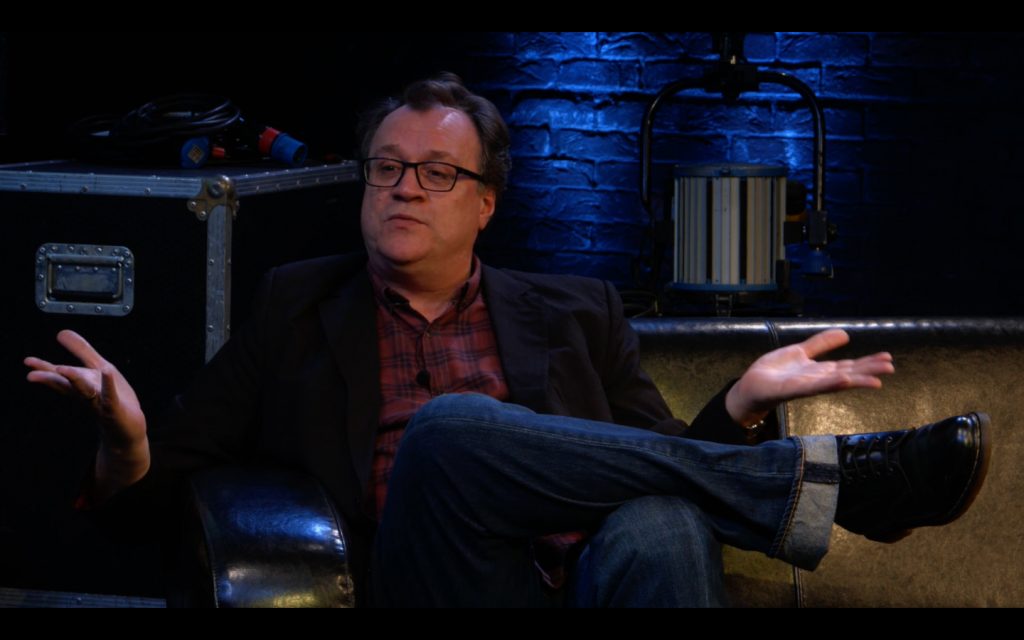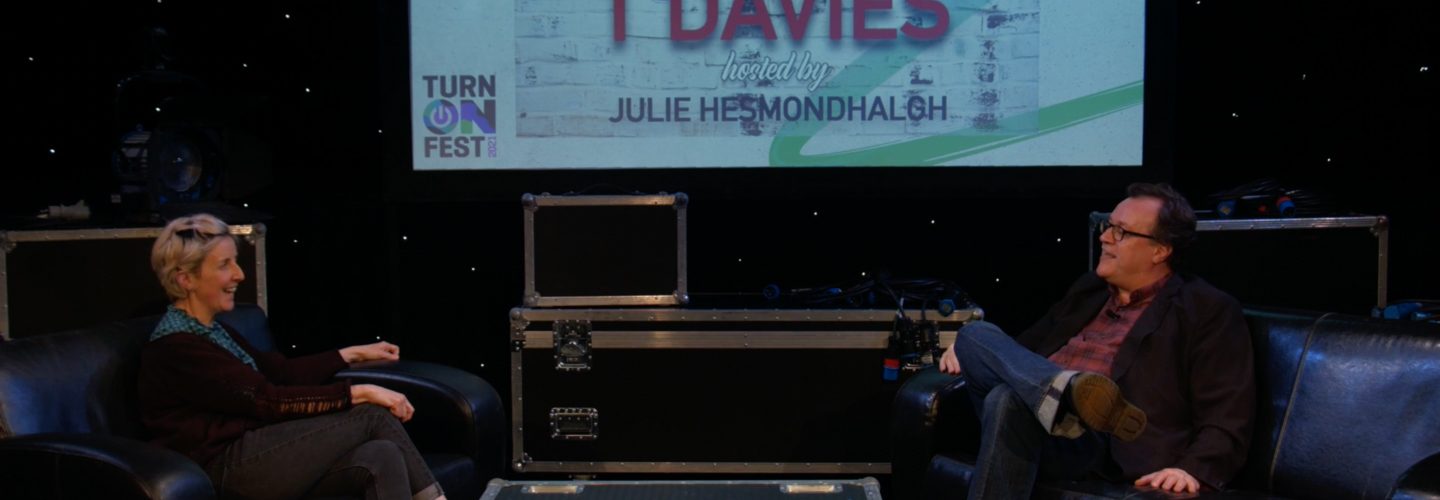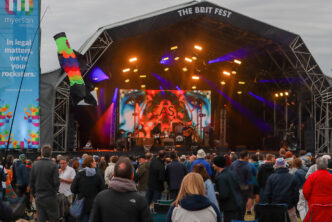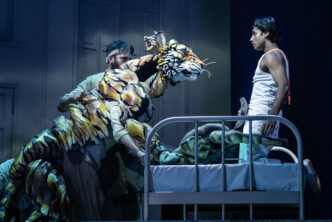It was an absolute pleasure to watch an Interview with Russell T Davies at the Hope Mill Theatre. This headliner event, topped the bill of their annual LGBTQIA+ theatre festival Turn On Fest. In an intimate setting with silver equipment boxes serving as a coffee table, actress, Julie Hesmondhalgh took the role of interviewer in this 1.5 hour, delightful ramble through the life of Hope Mill patron, Davies, exploring how his upbringing and career shaped him into being the fantastic writer, artist and producer we know and love him for.
Bringing together Hesmondhalgh and Davies was a perfect coupling, as they were both relaxed and happy in each other’s company, saying that they had shared a drink in the bar at the Hope Mill Theatre on many an occasion in the past. The interview felt like being a fly on a wall as two friends chat about the incredible career Davies has enjoyed, as well as the advances both of them have championed in the representation and acceptance of gay and trans people in television and society in general.
Julie framed her questions by explaining her preparation for the interview had involved her immersing herself in “Russell-World” for the previous few days, and her premise for the interview was that she had a Davies sized (6ft 6”!) paper cut-out that she wanted to fill with the people, inspirations and moments in his life that had Maketh the Man he is now.
Starting out with this childhood, we were provided with the impression of a very happy period in his life. Growing up in Swansea, with two sisters, and parents who were both teachers, he spoke about how they were both positive influences on his decision to work in the arts. A key cog in the family wheel was the local rugby club, where most of the family congregated on a Saturday night, where Davies, surrounded by the heady smell of beer, was only concerned about getting back home in time to watch his beloved Dr Who. With a frame for a rugby player, and with such a culture of rugby in his home country, his father might have expected him to make this his passion, but instead told him: ‘You don’t have to do anything that you don’t want to do’.
Davies was therefore able to make his entry into the arts, belonging to the South Glamorgan Youth Theatre, as well as crafting his skill as a cartoonist, taking inspiration from his supply of Asterix books. The Youth Theatre presented more than just a space to practise his acting, it also provided a ‘gay space’ where other budding thespians were able to embrace “their campness”. He explains that the Youth Theatre was a very professional outfit, where plays were properly arranged, and very disciplined in how they were conducted – all skills required for a successful producer of future TV hits. Davies says that being involved in the Youth Theatre and the arts in general ‘opens your mind and imagination’.
That imagination as a 15 years old, (and in the present) never seems to stop working for Davies. As that 15 year old, would walk home from school, imagining new plots for Dr Who. One of his first ever memories is at around three years old, hiding by the side of the sofa, being terrified of the Cybermen!

His first foray into work was actually using his artist drawing skills, working on illustration of the Oxford handbook and posters for various theatres (he has designed posters for Hope Mill Theatre previously). He hopes to return to his incredible skills as a cartoonist again soon.
Having been rejected from a BBC Traineeship twice, Davies managed to gain a position on the very popular kids TV show ‘Why Don’t You’. Starting on the studio floor to help the kids with their lines (including a 12 year old Ant from the famous duo), he progressed to writing the scripts for the shows after a particular long lunch of 8-plus beers incapacitated the then producer from writing the script that day, and enabling Davies to show what he was capable of. In 1987, the programme transfered to Manchester, and Davies moved here with it.
Julie prompted Davies for details of the TV he was involved with prior to really hitting the big time with Queer as Folk. He loved his time writing soaps at Granada, in which he was responsible for the introduction of many gay characters into TV. He says this was not something that he did ‘with a political plan’ in mind, he simply added them since he was gay and many of the people he was working with were gay – so it just seemed natural.
Queer as Folk, which Davies picks as his creation that he is most proud of, was his first show with a massive budget – so they threw everything at it. Not only did Davies write the ground breaking show, but he also had strong influence on everything from what people wore, to style, colour palette and tone. He says that Queer as Folk changed his life, and doors are still open to him because of the show.
The success of his recent show ‘It’s a Sin’ was as much a shock to Channel 4 bosses as it was to Davies himself. He felt compelled to write this as a matter of capturing a time in history where he felt insufficient record has been made. He says he was shocked that so many people, particularly the younger generation had not idea that this period had happened in our recent history. He wanted to capture a time of such joy and sorrow, and feels the success of the show is down to the actors, where sometimes you just got magic in the scenes. He also reveals that the title is not actually from the Pet Shop Boy’s song, but rather song from the 1930s ‘It’s a sin to tell a lie’, which had been in his head since his early years in Swansea, when his family used to sing it around their piano.
Julie, who played Cleo Whitaker in Davies’ Cucumber, one of three shows with Banana and Tofu, explored why these shows were not such as hit, concluding that they were probably ahead of their time, Streaming figures for the shows have spiked since It’s a Sin was broadcast and hopefully they will have the attention they deserve now.
Finally, Julie asked if Davies has to send something out into space which provided an aliens an impression of human life – what would it be. His response shows that despite his success of Queer as Folk, the programme that is and will always be his true love is Dr Who. Davies says that his progression from watching Dr Who as a small boy behind the sofa, to becoming the executive producer of the programme ‘proves that dreams can come true’. He says he would send a tiny Dalek into space, as Dr Who is an extraordinary gift to the world. It is actually Mr Davies himself that is that extraordinary gift to UK arts and television. He has a new show mulling in his head at the moment – but we will have to wait to find out what that is going to be about!





